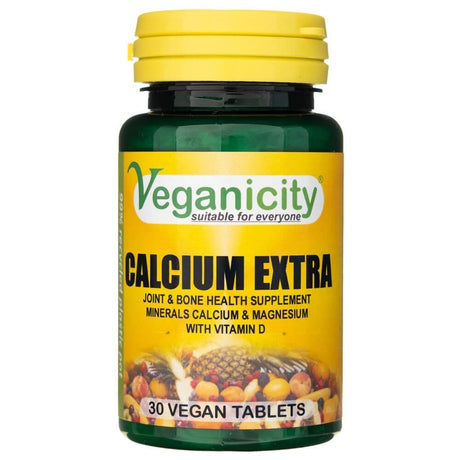Solgar
Solgar Kalsium-magnesium ja D3-vitamiini - 150 tablettia
Normaalihinta €18.49Yksikköhinta€0.12 per tuoteLife Extension
Life Extension Bone Restore K2-vitamiinin kanssa - 120 kapselia
Alennushinta €26.96 Normaalihinta €28.39Yksikköhinta€0.22 per tuoteSolgar
Solgar Kalsium-magnesiumsitraatti - 100 tablettia
Normaalihinta €23.89Yksikköhinta€0.24 per tuoteProgress Labs
Progress Labs Kalsium + C-vitamiini - 120 kapselia
Normaalihinta €6.99Yksikköhinta€0.06 per tuoteSwanson
Swanson Mineraalisitraattikompleksi - 60 kapselia
Normaalihinta €5.29Yksikköhinta€0.09 per tuotePowerBar
PowerBar Elektrolyytit ilman sokeria, Mango-Passion Fruit - 10 poreilevaa tablettia
Normaalihinta €5.29Yksikköhinta€0.53 per tuoteNow Foods
Now Foods Korallikalsium 1000 mg - 250 Veg-kapselia
Normaalihinta €31.69Yksikköhinta€0.13 per tuoteSolgar
Solgar Kalsium 600 (osterin kuoresta D3-vitamiinin kanssa) - 120 tablettia
Normaalihinta €16.39Yksikköhinta€0.14 per tuotePharmovit
Pharmovit D3-Vit 4000 IU Öljy Active - 30 ml
Alennushinta €8.99 Normaalihinta €9.99YksikköhintaSolgar
Solgar U-Cubes Lasten kalsium D3:n kanssa - 60 kumirouhetta
Normaalihinta €11.69Yksikköhinta€0.19 per tuoteNow Foods
Now Foods Kalsium ja magnesium - 240 pehmytkapseliä
Normaalihinta €23.29Yksikköhinta€0.10 per tuoteSolgar
Solgar Kalsium 600 (osterin kuoresta D3-vitamiinin kanssa) - 240 tablettia.
Normaalihinta €30.89Yksikköhinta€0.13 per tuoteSolgar
Solgar Pureskeltava kalsium 500 mg - 120 kiekkoa
Normaalihinta €15.89Yksikköhinta€0.13 per tuoteVitaler's
Vitaler's Kalsiumsitraatti 1200 mg + D3-vitamiini 2000 IU – 60 kapselia
Normaalihinta €7.09Yksikköhinta€0.12 per tuoteNow Foods
Now Foods Kalsium ja magnesium - 250 tablettia.
Normaalihinta €23.99Yksikköhinta€0.10 per tuoteActivlab
Activlab Pharma Osteoperos 1000 - 100 kapselia
Normaalihinta €9.29Yksikköhinta€0.09 per tuoteActivlab
Activlab Pharma Allerin PRO - 20 poreilevaa tablettia
Normaalihinta €2.59Yksikköhinta€0.13 per tuoteNow Foods
Now Foods Kalsiumkarbonaatti Puhdas jauhe - 340 g.
Normaalihinta €9.89Yksikköhinta€29.09 /kgVeganicity
Veganicity Kalsium Extra + Magnesium + D-vitamiini - 30 tablettia
Normaalihinta €5.29Yksikköhinta€0.18 per tuoteNow Foods
Now Foods Kalsium ja magnesium - 100 tablettia
Normaalihinta €14.79Yksikköhinta€0.15 per tuoteNow Foods
Now Foods Cal-Mag Stress Formula (Kalsium, Magnesium, B-vitamiini) - 100 tablettia
Normaalihinta €15.49Yksikköhinta€0.15 per tuoteLife Extension
Life Extension Kalsiumsitraatti ja D-vitamiini - 200 kapselia
Normaalihinta €27.99Yksikköhinta€0.14 per tuote
Kalsiumin elintärkeän roolin ymmärtäminen kehossasi
Kalsium on perustavanlaatuinen kivennäisaine, jonka osuus kehon painosta on 1,4-1,7%, ja josta 99% on luissa. Tämä olennainen elementti ei ainoastaan tue luuston terveyttä ; se toimii monien entsyymien kofaktorina, tukee verenkiertoelimistöä, ja varmistaa lihasten asianmukaisen toiminnan. Vaikka kalsium on elintärkeää kaikille, sen merkitys korostuu erityisesti lapsuudessa ja muissa keskeisissä elämänvaiheissa.
Miten kalsium toimii elimistössä
Kalsiumilla on keskeinen rooli vahvojen, terveiden luiden rakentamisessa ja ylläpitämisessä. Elimistön on jatkuvasti täydennettävä kalsiumvarastojaan, sillä puute voi aiheuttaa luun kalkinpoistoa, mikä johtaa luukatoon ja lisääntyneeseen murtuma-alttiuteen TiB. Luuterveyden lisäksi, kalsiumilla on useita elintärkeitä tehtäviä:
- Helpottaa hermovälitystä johtamalla hermoimpulsseja
- Osallistuu veren hyytymisprosesseihin
- Säätelee solujen uusiutumista ja hedelmöittymisreaktioita
- Ohjaa lihassupistuksia. ja hormonien vapautumista
Riittävän kalsiumin saannin varmistaminen on erityisen tärkeää lisääntyneen kysynnän aikana, kuten raskauden aikana, nopeissa kasvuvaiheissa, vaihdevuosien aikana, ja ikääntyneillä aikuisilla, joilla on ikääntymisvaikeuksia
,,liittyvä luuntiheyden menetys.
Kalsium vs. kalkki:
On tärkeää erottaa toisistaan kalsium ja kalkki, koska ne sekoitetaan usein. Kalsium on olennainen kivennäisaine, joka tukee luuston terveyttä ja jota on ravintolisissä. Kalkki, taas, on maataloudessa ja rakentamisessa käytetty kemikaali, joka ei sovellu ihmisravinnoksi. Vaikka kalkkikivi, kalsiumkarbonaattia sisältävä sedimenttikivi, liittyy kalsiumiin, se on erillinen aine.
Kalsium yhteensä:
Kokonaiskalsium on keskeinen diagnostinen parametri, joka mitataan veriseerumista. Tämä testi auttaa arvioimaan elimistön kokonaiskalsiumtasoja, ja sitä käytetään yleisesti luuston, munuaisten, lisäkilpirauhasen, ja ruoansulatuskanavan terveyden seurantaan. Säännölliset kalsiumpitoisuusmittaukset ovat yhä useammin osa ennaltaehkäiseviä terveystarkastuksia, jotta mahdolliset puutostilat voidaan havaita varhaisessa vaiheessa ja toimenpiteisiin voidaan ryhtyä ajoissa.
Kalsiumin kriittinen merkitys lasten terveydelle
Kalsium on erityisen elintärkeä lapsille, sillä on ratkaiseva merkitys luuston kehityksessä ja yleisessä kasvussa. Kalsiumin merkitys on merkittävin kolmen ensimmäisen elinvuoden aikana, jolloin luut kasvavat ja kehittyvät nopeasti. Riittävä kalsiumin saanti lapsuudessa voi auttaa ehkäisemään riisitautien kaltaisia sairauksia ja pienentää osteoporoosin riskiä myöhemmin elämässä.
Kalsiumpitoiset elintarvikkeet tasapainoiseen ruokavalioon
Maitotuotteet ovat tunnettuja kalsiumin lähteitä, Monet muut elintarvikkeet voivat auttaa kattamaan kalsiumin tarpeen:
- Kala: Sardiinit, lohi, ja kilohaili
- Pähkinät ja siemenet: Vihannekset: Mantelit, hasselpähkinät, ja seesaminsiemenet
- Vihannekset: Manteleita, hasselpähkinöitä, ja seesaminsiemeniä
- Vihanneksia: Kalsiumilla täydennetyt elintarvikkeet: lehtikaali, parsakaali, ruusukaali, ja vihreät pavut
- Kalsiumilla täydennetyt elintarvikkeet:
Kun valitset maitotuotteita, valitse vähärasvaisia tai rasvattomia vaihtoehtoja välttyäksesi liialliselta tyydyttyneen rasvan saannilta. Muista, monipuolinen ruokavalio, jossa on runsaasti kalsiumia sisältäviä elintarvikkeita, on avainasemassa optimaalisten kalsiumtasojen ylläpitämisessä ja yleisen terveyden tukemisessa.
Johtopäätös:
Kalsiumin merkityksen ymmärtäminen ja riittävän saannin varmistaminen on ratkaisevan tärkeää luuston vahvuuden, lihasten asianmukaisen toiminnan, ja yleisen terveyden ylläpitämiseksi koko elämän ajan. Kalsiumin saannin priorisointi voi edistää merkittävästi pitkän aikavälin hyvinvointia, olipa kyse sitten tasapainoisesta ruokavaliosta tai lisäravinteista. Jos olet huolissasi kalsiumtasostasi tai harkitset lisäravinteiden ottamista, ota yhteyttä terveydenhuollon ammattilaiseen, jotta voit määrittää parhaan lähestymistavan yksilöllisiin tarpeisiisi.


















































